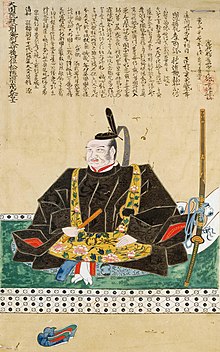This article includes a
list of references,
related reading, or
external links, but its sources remain unclear because it lacks
inline citations. (June 2021) |
Tachibana Muneshige | |
|---|---|
| 立花宗茂 | |
 Tachibana Muneshige | |
| Head of Tachibana clan | |
| In office 1581–1642 | |
| Preceded by | Tachibana Dōsetsu |
| Succeeded by | Tachibana Tadashige |
| Lord of Tanagura | |
| In office 1603–1620 | |
| Succeeded by | Niwa Nagashige |
| Lord of Yanagawa | |
| In office 1620–? | |
| Preceded by | Tanaka Tadamasa |
| Succeeded by | Tachibana Tadashige |
| Personal details | |
| Born | Senkumamaru (千熊丸) December 18, 1567 |
| Died | November 15, 1643 (aged 75) |
| Nationality | Japanese |
| Spouse | Tachibana Ginchiyo |
| Parent |
|
| Relatives | Tachibana Dōsetsu (father-in-law) |
| Other name | Tachibana Munetora (立花宗虎 or 立花統虎) |
| Military service | |
| Allegiance |
|
| Unit | Takahashi clan |
| Battles/wars |
Kyūshū Campaign Siege of Odawara Korean Campaign Siege of Ōtsu Siege of Yanagawa Siege of Osaka Shimabara Rebellion |
Tachibana Muneshige (立花宗茂, December 18, 1567 – November 15, 1643), known in his youth as Senkumamaru (千熊丸) and alternatively called Tachibana Munetora (立花宗虎 or 立花統虎), was a samurai during the Azuchi–Momoyama period and an Edo-period daimyō.
He was the eldest biological son of Takahashi Shigetane, a senior retainer of Ōtomo clan. [1] He was adopted by Tachibana Dōsetsu, [1] and later married his daughter Tachibana Ginchiyo, succeeding the Tachibana clan.
In 1600, at Sekigahara campaign, he sided with the 'Western army'. [1] However, Muneshige surrendered during the Siege of Yanagawa under the assumption that he could then switch sides and aid the Tokugawa-loyal forces against the Shimazu clan of Satsuma. After the battle of Sekigahara, he was deprived of the Yanagawa Domain for punishment by Tokugawa Ieyasu. [1]
He participated in the Siege of Osaka (1614-1615) and later he was brought back to the former territory, Yanagawa. [1]
In 1637, Muneshige served in the shogunate army during the Shimabara Rebellion (1637-1638), a revolt involving mostly Japanese peasants, most of them Catholics. He was then given a small territory in Tanagura. [1]
Muneshige in popular culture
See People of the Sengoku period in popular culture.
Honours
- Junior Third Rank (November 10, 1915; posthumous)
Notes
References
Further reading
- Genjō Sanjin. Kyūshū sengokushi: Bekki gundan. Tōkyō: Rekishi Toshosha, 1978. OCLC 70792159
- Kawamura, Tetsuo. Tachibana Muneshige. Fukuoka-shi: Nishi Nihon Shinbunsha, 1999. ISBN 4816704884 OCLC 44470864
- Nakano, Hitoshi. Tachibana Muneshige. Tōkyō: Yoshikawa Kōbunkan, 2001. ISBN 4642052208 OCLC 46390748
- Tachibana, Muneshige, and Tōun Hasegawa. Ehon hōkan. Setsuyō [Osaka]: Kankidō Shigeyuki, 1688. OCLC 26843338
This article includes a
list of references,
related reading, or
external links, but its sources remain unclear because it lacks
inline citations. (June 2021) |
Tachibana Muneshige | |
|---|---|
| 立花宗茂 | |
 Tachibana Muneshige | |
| Head of Tachibana clan | |
| In office 1581–1642 | |
| Preceded by | Tachibana Dōsetsu |
| Succeeded by | Tachibana Tadashige |
| Lord of Tanagura | |
| In office 1603–1620 | |
| Succeeded by | Niwa Nagashige |
| Lord of Yanagawa | |
| In office 1620–? | |
| Preceded by | Tanaka Tadamasa |
| Succeeded by | Tachibana Tadashige |
| Personal details | |
| Born | Senkumamaru (千熊丸) December 18, 1567 |
| Died | November 15, 1643 (aged 75) |
| Nationality | Japanese |
| Spouse | Tachibana Ginchiyo |
| Parent |
|
| Relatives | Tachibana Dōsetsu (father-in-law) |
| Other name | Tachibana Munetora (立花宗虎 or 立花統虎) |
| Military service | |
| Allegiance |
|
| Unit | Takahashi clan |
| Battles/wars |
Kyūshū Campaign Siege of Odawara Korean Campaign Siege of Ōtsu Siege of Yanagawa Siege of Osaka Shimabara Rebellion |
Tachibana Muneshige (立花宗茂, December 18, 1567 – November 15, 1643), known in his youth as Senkumamaru (千熊丸) and alternatively called Tachibana Munetora (立花宗虎 or 立花統虎), was a samurai during the Azuchi–Momoyama period and an Edo-period daimyō.
He was the eldest biological son of Takahashi Shigetane, a senior retainer of Ōtomo clan. [1] He was adopted by Tachibana Dōsetsu, [1] and later married his daughter Tachibana Ginchiyo, succeeding the Tachibana clan.
In 1600, at Sekigahara campaign, he sided with the 'Western army'. [1] However, Muneshige surrendered during the Siege of Yanagawa under the assumption that he could then switch sides and aid the Tokugawa-loyal forces against the Shimazu clan of Satsuma. After the battle of Sekigahara, he was deprived of the Yanagawa Domain for punishment by Tokugawa Ieyasu. [1]
He participated in the Siege of Osaka (1614-1615) and later he was brought back to the former territory, Yanagawa. [1]
In 1637, Muneshige served in the shogunate army during the Shimabara Rebellion (1637-1638), a revolt involving mostly Japanese peasants, most of them Catholics. He was then given a small territory in Tanagura. [1]
Muneshige in popular culture
See People of the Sengoku period in popular culture.
Honours
- Junior Third Rank (November 10, 1915; posthumous)
Notes
References
Further reading
- Genjō Sanjin. Kyūshū sengokushi: Bekki gundan. Tōkyō: Rekishi Toshosha, 1978. OCLC 70792159
- Kawamura, Tetsuo. Tachibana Muneshige. Fukuoka-shi: Nishi Nihon Shinbunsha, 1999. ISBN 4816704884 OCLC 44470864
- Nakano, Hitoshi. Tachibana Muneshige. Tōkyō: Yoshikawa Kōbunkan, 2001. ISBN 4642052208 OCLC 46390748
- Tachibana, Muneshige, and Tōun Hasegawa. Ehon hōkan. Setsuyō [Osaka]: Kankidō Shigeyuki, 1688. OCLC 26843338